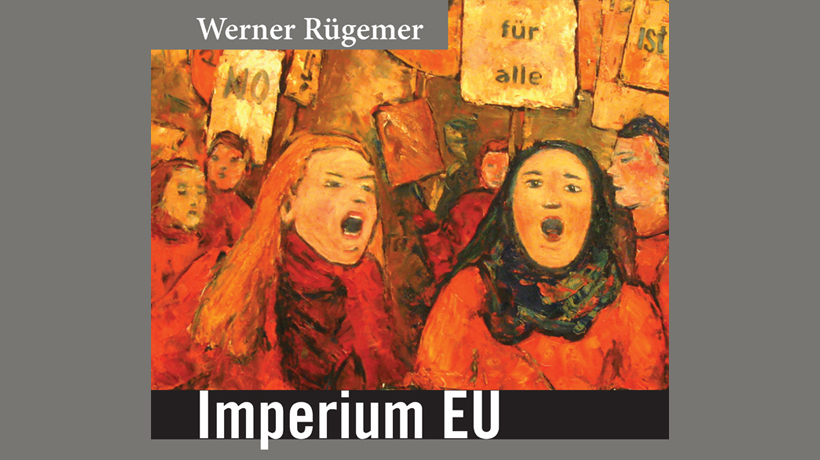The Cologne-based publicist and “interventionist philosopher,” as Werner Rügemer calls himself, has been critically examining the privatization of the world and the predations of powerful corporations and institutions for decades. With “Imperium EU – Labor injustice, crisis, new resistances” he dedicates himself to the situation of the working class in Europe.
The EU as a militarized and deadly “fortress of wealth”
In the introduction of the book which has been published originally in German, the author refers to the “collective self-blinding of virologists and epidemiologists” who do not see or do not want to see, that above all the poor and the exploited are endangered by Corona, but also by the economic measures. The financial investor BlackRock, of all people, got a consulting contract for the European Central Bank (ECB) for the reconstruction of the economy after Corona and for the “Green Deal” of the EU.
How the EU became what it is today
In the first part of the book, Werner Rügemer dissects the development of the systematic disenfranchisement of working people in Europe since the end of the Second World War with a sharp eye for class differences and glaring injustices, underpinned by numerous notes and references to literature. This labor injustice is for him “the essential reason for the political development of right-wing movements” (p. 31). Migrant workers, refugees and women are particularly exploited, which would be tabooed by companies “with the help of the ‘new values’ such as ‘diversity’, promotion of up-and-comers from ethnic and other minorities” (p. 34).
The EU as a “geopolitical fortress of wealth” participates “in the new US-led wars” (p. 45) and violates elementary human rights when it “directly or indirectly organizes” the death of refugees in the Mediterranean. Internally, it erects “walls of gated communities of the super-rich against the poor” (p. 46). After World War II, NATO was founded and as its “twin creature” (p. 62), the Marshall Plan was introduced to rebuild the war-torn economy. The author describes connections between U.S. influence, militarization, and disenfranchisement of workers, and clearly highlights the role of the “founding fathers of Europe” (p. 97), Jean Monnet and Walter Hallstein.
Disenfranchisement and corporate power
In EU treaties and documents, neither the universal human rights of the United Nations (UN) nor the labor standards of the International Labor Organization (ILO) would be fully taken into account. But even this EU law would not be respected. In this regard, “the EU model state Germany” (p. 109) is leading the way by not adopting labor rights from the EU Social Charter, for example, or by not following the Fertilizer Directive.
“The EU bureaucracy does not act sovereignly at all,” Werner Rügemer criticizes. Lobbying associations of companies, consulting firms and law firms maintain “a worldwide network of self-service and corruption for high society” (p. 117). With the “Green Paper – A Modern Labour Law for the Challenges of the 21st Century” in 2006, the EU had “summarized the previous forms of precarization into an overall concept” (p. 147). However, the role of the EU is ambivalent; for example, the European Court of Justice also makes judgments in favor of employees. However, “it is about individual rights, never about strengthening collective rights, such as those of trade unions or work councils” (p. 158).
In the “European Pillar of Social Rights”, which was introduced in 2017, vague terms such as “equal opportunities” or “social inclusion” are found, working conditions and pay should be “fair” or “appropriate”. The lobbying efforts of the financial investor BlackRock had succeeded in proposing a “people’s share” for private pension provision to the European Commission. This financial product called ETF (Exchange Traded Fund) should be tax-subsidized by the member states. Werner Rügemer describes “eight EU institutions for the enforcement of labor injustice” (p. 171). He explains how the European Social Fund (ESF), introduced as early as 1957, finances projects “outside any human rights of labor” (p. 174), thus advancing precarization without any significant resistance from trade unions.
Social struggles and trade union organizing
The second part of the book is dominated by descriptions of exploitation and disenfranchisement. It is divided according to countries or groups of countries and shows the specific manifestations of labor injustice in each case. Since 1990, Germany has developed into “the leading state of labor injustice in the EU” (p. 210). The EU accession candidate North Macedonia is already a NATO member and has developed as a low-wage country “into the ‘Bangladesh’ of the EU” (p. 239). In Poland, more and more special economic zones for corporations are being created.
Most important, however, are the hopeful beginnings of resistance. In France, for example, the yellow vests are “the leading movements against capital Europe” (p. 216). In Spain, there are many strikes, in which women play an important role, and in the Andalusian plastic seas, the union of agricultural workers is fighting with the support of the Berlin Interbrigadas. “One of the most important labor struggles” (p. 274) is being waged by Amazon workers who have networked internationally.
The book provides harrowing insights into an issue that features far too little in political debates. From some of the author’s formulations, one can read his anger at the injustices. With the treasure trove of horror and hope presented here, he makes visible the millions of people who, under degrading and disenfranchised conditions and at the risk of their bodies, ensure day after day that social and technical infrastructures are built and function and that goods are produced and distributed.
Werner Rügemer: Imperium EU – Labor injustice, crisis, new resistances. 286 pages, tredition Hamburg 2021, ISBN 978-3-347-37267-2 hardcover; also as paperback and eBook
This book review was published in October 2021 in „Libertäre Buchseiten der Graswurzelrevolution“ (Libertarian Book Pages of the Grassroots Revolution).






